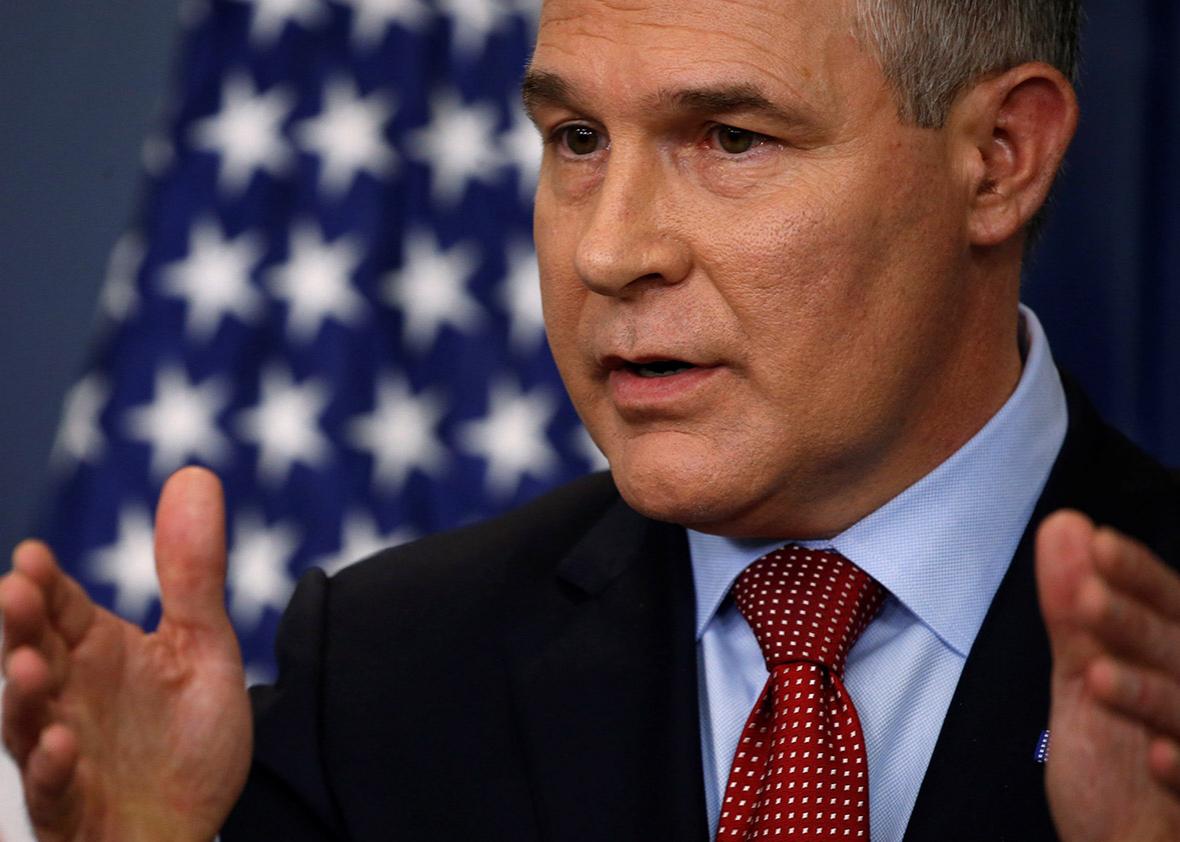Once a year, the Environmental Protection Agency’s Board of Scientific Counselors and the EPA’s Office of Research and Development get together to publically debate the current direction of the EPA’s research. The BOSC releases a review of the agency’s research plan to point out strengths and weaknesses, and the ORD responds and addresses the BOSC’s criticism. The EPA isn’t perfect, but these conversations have indicated an interest in environmental protection and robust scientific debate.
This open exchange seems destined to change dramatically in Scott Pruitt’s EPA. On Tuesday, Science reported that 38 of the 49 members of BOSC will not have their contracts renewed when they expire at the end of August. The BOSC was already down 12 members—those whose terms were up in April were not renewed, either. And the 11 BOSC members still standing might not be there for long either: An email from Acting Assistant Administrator Robert Kavlock to BOSC members states that anyone whose term is up in March will also have to re-apply and be reconsidered for the position, meaning they won’t be automatically renewed either. BOSC meetings through 2018 have been canceled.
Close to the entire BOSC could be reappointed within the next year. As the Washington Post reported, this is not normal. Usually the three-year appointments are automatically renewed, and most scientists serve six-year terms.
Peter Meyer, professor emeritus of urban policy and economics at the University of Louisville, used to serve on the BOSC. He and Carlos Martin, another member, resigned on May 12 and expressed fear that the board would no longer be objectively reviewing science. “We do not have a reduced BOSC, we don’t have a BOSC [at all],” Meyer told me. EPA employees “were given marching orders,” he continued, “Nobody on BOSC gets renewed.”
Who will fill these vacant positions? A spokesperson for the EPA’s administrator, Scott Pruitt, told the New York Times that Pruitt was considering replacing the scientists currently on the board with representatives from industries that are regulated by the EPA like coal, gas, and oil. “The administrator believes we should have people on this board who understand the impact of regulations on the regulated community,” spokesman J.P. Freire told the Times.
The BOSC isn’t the only board whose composition could be seriously changed. There’s been a parallel movement in Congress to allow more industry representatives on another EPA advisory board—the Science Advisory Board. The EPA Science Advisory Board Reform Act, recently passed by the House of Representatives in late March, makes it easier for scientists with industry ties to serve on the board, to the detriment of academics. That bill hasn’t passed the Senate yet, and it may not. And as Dan Engber persuasively argued in Slate in May, review boards will always reflect some sort of bias, be it industry or academic:
It’s certainly true that the makeup of a peer-review panel, and all the inclinations that its members bring, will help determine its decisions. It’s not like peer review converges, by its nature, on some objective answer to a scientific question; rather, it attempts to find a sensible, subjective synthesis of uncertain data points. And while we’ve seen ample and disturbing evidence of industry-enabled bias, it’s also true that academic, independent, progressive-minded researchers show a tendency, from time to time, to cherry-pick data that fits their predilections.
This is true. But what’s frightening about the EPA’s recent moves is not that industry members are getting greater say—it’s that they seem to be on track for gaining almost complete majorities. And considering the leader at the top, that’s not terribly surprising. When an EPA spokesperson says Pruitt wants to take “as inclusive an approach to regulation as possible,” and represent “issues that aren’t typically represented,” we can understand that as Pruitt being inclusive toward industry.
During his time as the Oklahoma attorney general, Pruitt routinely asked oil-and-gas companies for help with policy communications between his office and the EPA. The most extreme example occurred in 2013. In June of that year, Pruitt received a letter from oil-and-gas company Devon Energy objecting to proposed fracking regulations. In August 2013, he took that same letter, transcribed it onto state letterhead, and published it as his own writing. The way things are going so far, it’s possible that soon, repurposing of industry sentiment as government edict won’t be a scandal—it’ll just be a normal day at the EPA.
